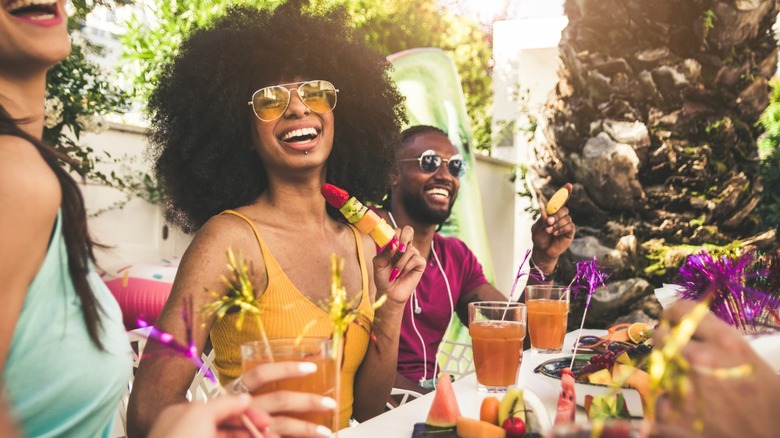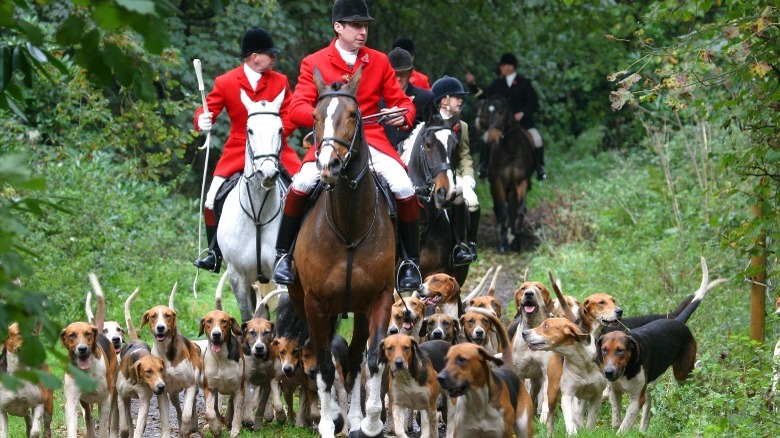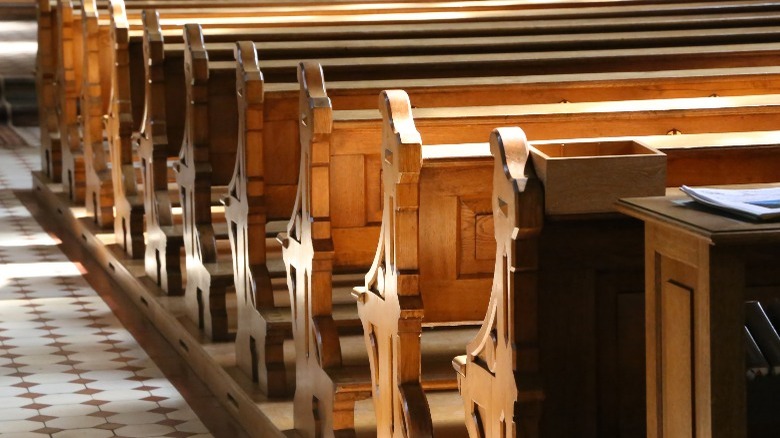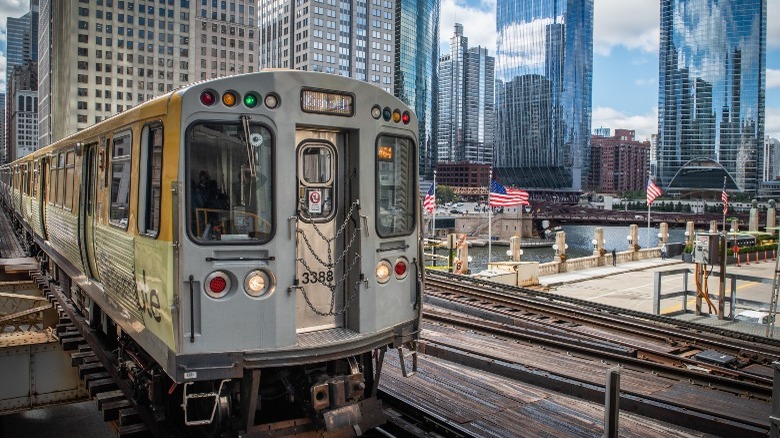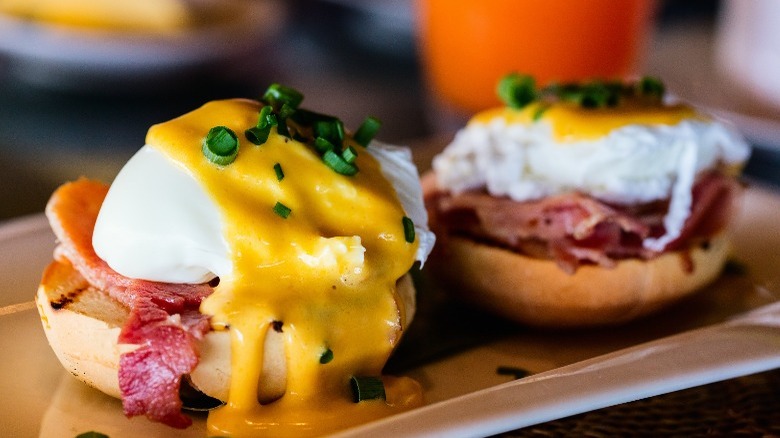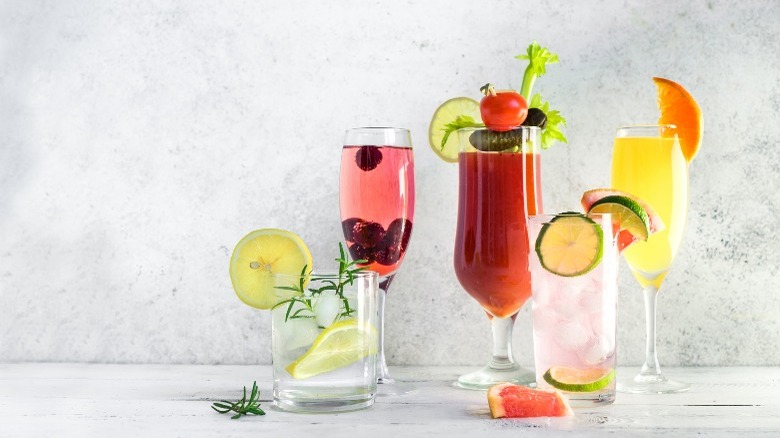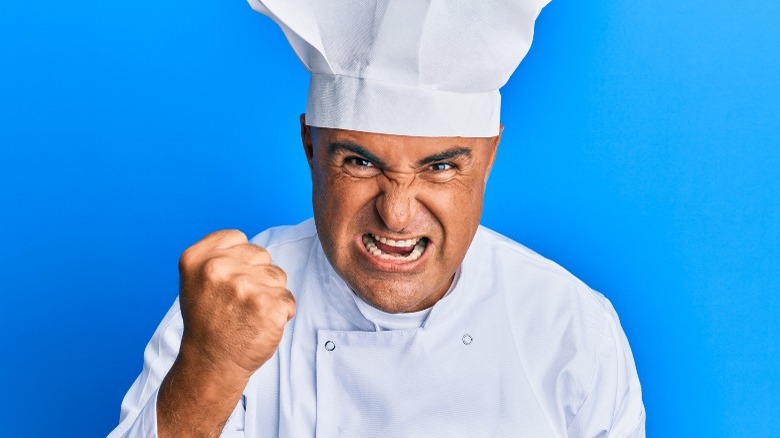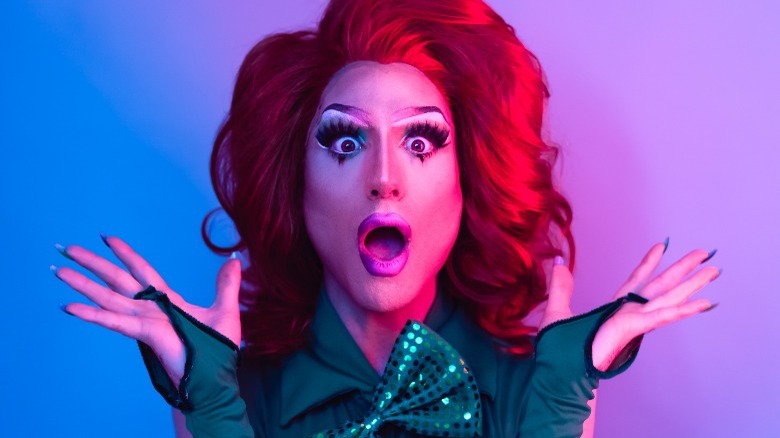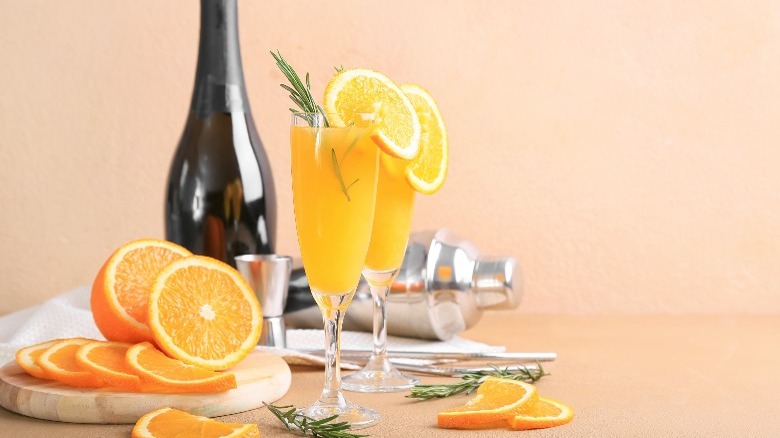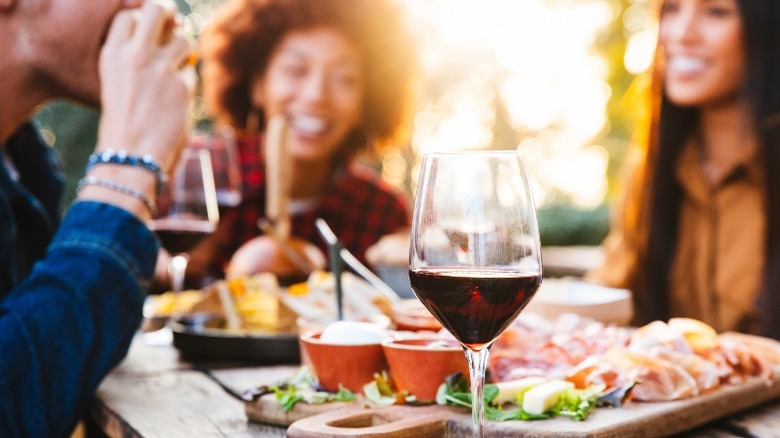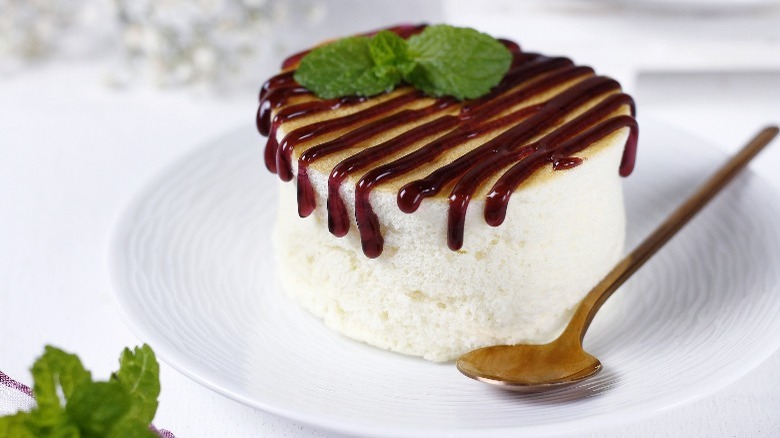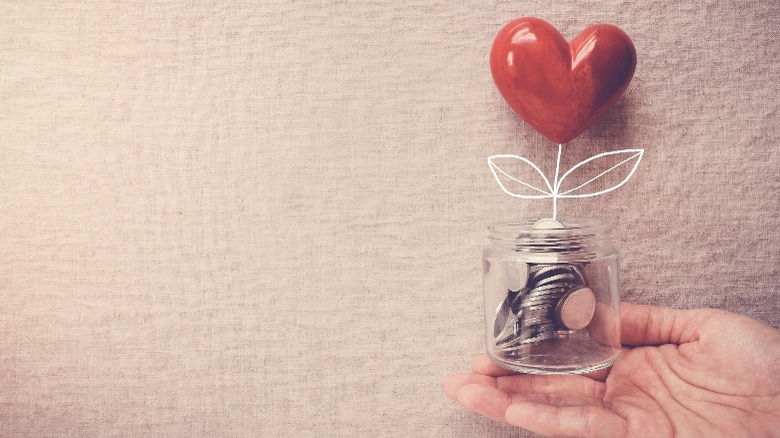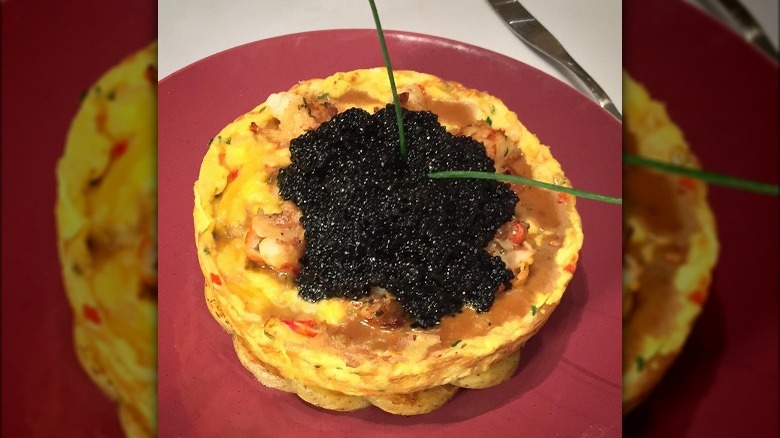The Untold Truth Of Brunch
Brunch brings friends together after long weekend adventures and even longer work weeks. It's two meals made one with all the best of both. It's a reason to get up on a lazy Sunday, but not too early, and you mustn't forget the cocktails.
Whether it's an orderly farewell to the weekend or a regrouping after a tumultuous night on the town, brunch takes many forms. It's easy to sing its praises or dismiss it as a bougie show, but the lunchtime breakfast has a few secrets to share. It's been around longer than you may think, and you may be surprised which elements have stood the test of time.
Love it or hate it, there's a lot to say about brunch. How well do you know your most (or least) favorite meal? It's crossed continents and cultures, making friends and enemies along the way. Find out who loves brunch as much as you do, or who hates it even more.
It has an aristocratic pedigree
Brunch's elitist ties go way back. They begin with the term's inception, in fact. The word "brunch" first appeared in print in an 1895 issue of Hunter's Weekly. The author, Guy Beringer, extols the virtue of the meal and credits the term to university students, but late weekend breakfasts were already established custom in certain circles of the aristocracy.
The English leisure class spent time in the country with friends hunting. It was more social than practical, and the meals reflected that. It was tradition to eat a large, varied meal with both hearty and expensive breakfast dishes just before or after a hunt. The hunt breakfast, says Horse Canada, became a recognized meal long before brunch got its name, and they have a lot in common. Both meals are weekend events, are most often eaten with friends, and have an association with breakfast, despite being served at lunch. There's an argument to be made that brunch is simply a hunt breakfast without the hunt (or the sweeping country estate).
It boomed with Catholic Mass
A theory relayed by Smithsonian Magazine suggests brunch gained popularity in part thanks to Catholics fasting prior to Sunday Mass. They left the house without eating, attended Mass, and once the service ended, they left to enjoy a big breakfast (per Gotham Bagels). By that time, they'd normally be enjoying lunch. Sound familiar?
It's worth noting that fasting before Mass may not have always been intentional, either. While the rules governing fasting within the Catholic Church shift between eras and cultures, as the United States Conference of Catholic Bishops explains, it isn't uncommon for members of other Christian denominations to skip breakfast on Sunday. Today, many churches offer donuts between services, assuming sleepy worshipers didn't rise early enough for a proper meal on their way to praise. This type of hospitality is a pretty new thing (at least in Western Christian churches), and Mass didn't come with donuts a century ago. It's easy to see the link between lots of people leaving Mass in cities with high Catholic populations and a rush to eat late Sunday morning.
Chicago was America's first brunch destination
When brunch came to America, it set its hooks in Chicago. Then as now, the city was a major hub for trains, and folks traveling between the East and West Coasts usually hit the city around brunch time, reports Brunch DC. Per Parade, the Ambassador Hotel in Chicago became the favorite of movie stars and other glitterati to take brunch during their long journey. According to Venue Report, stars like Marilyn Monroe and Frank Sinatra ate at the Ambassador, and wherever such big names appeared, the press followed.
With so many big, popular names appearing next to "brunch" in the papers, the meal continued its reputation of borderline elitism, but it also became desirable to the masses. Just like today, people rushed to emulate their favorite celebrities. Influencers aren't a new concept, and simply enjoying brunch in a public place boosted the meal's popularity. Hotels also saw a market for this strange new meal. It looks like we have more to thank Sinatra for than his voice.
It took a new shape in New York
According to Smithsonian Magazine, a lot of traditional brunch foods, including bagels and lox, came from New York City's delis and diners, where cultural influences fused and hungry patrons could find the dishes best suited to their idea of breakfast. The truth of about eggs benedict is that they also come from New York — a historic restaurant called Delmonico's, to be precise.
The 1980s gave the world a lot of good music, a lot of bad hair cuts, and a lot of new ideas about brunch, particularly in the Big Apple (via Slate). New York City's Upper West Side took the meal and made it into a cultural touchstone. There are all kinds of people in New York, they're all busy, and they all have something unique to add to the brunch platter.
Today, the most popular brunch spots come with hour-long waits and staff eager to move patrons through faster than many wish to leave. We can't blame either side. It makes sense to feed more customers, but who wants to leave the brunch table?
It's always been boozy
Dinner has its wine pairings, and brunch has mimosas. Although the orange juice cocktails are fairly new as far as recognized brunch staples, alcohol has always had a seat at the table. Even Guy Beringer, the man to coin the word in print, added a cheeky post script to "Brunch: A Plea." He notes that tea and coffee can be exchanged for beer and whiskey, meaning the boozy brunch is as old as brunch itself.
Whether or not you drink with your food may depend more on what happened Saturday night than anything else. Conventional wisdom in New York's brunch scene (via Slate) suggests the bruncher who drank the night before should ease their passage into Sunday proper with a juicy cocktail. There's no rule that says those who spent Saturday sober must remain so on Sunday, but there may be less temptation from the Bloody Marys and more interest in the waffles.
Chefs often hate it
After the crush of a busy weekend, preparing food late into Friday and Saturday nights, an early morning call back to work early on Sunday just doesn't impress a lot of chefs. It's exhausting, and it taps into the time that service industry workers, particularly in higher-end restaurants, usually enjoy off. According to chefs interviewed by Thrillist, the chef at your favorite restaurant may not even be in the building during brunch hours. It is that loathed. Long wait times grow from understaffed kitchens, too.
It isn't just about enjoying the weekend, though. Many chefs and cooks take umbrage with the quality of brunch offerings. The Sunday brunch specials (per The New York Times) often provide a way for restaurants to get rid of their weekend leftovers, so it's safe to assume the vegetables in your omelet, the meat in your scramble, and even your brioche French toast may come from the remains of dinner specials past.
There's a record for the largest drag brunch
Drag brunches have a long history as support functions for members of local LGBTQ+ communities (per Thrillist). They helped raise funds during the HIV/AIDS crisis. They continue to help some communities raise funds, and these daytime performances are helping de-stigmatize the art form as well.
The biggest drag brunch of all time, however, has a special place in the books of the World Record Academy. On Sunday, March 31, 2019, Denver Drag Days (a three-day event in Denver, Colorado) held a very special brunch to celebrate the end of the event's inaugural year. Some 338 people attended, according to the Denver Post, enjoying live performances, alcohol, and a loaded buffet. The World Record Academy has since confirmed the event's place in the history books. This special Sunday brunch currently holds the record for the Largest Drag Brunch, but once someone sets a record, it's only a matter of time before someone else rises to challenge it.
Mimosas dominate brunch drinks
According to research from tastewise, the mimosa isn't just the most popular alcoholic brunch drink. It's the most popular beverage of all, beating out the holy grail of morning sips: coffee. It's statistically official, and it's played a role in at least one record-setting brunch. Even Bloody Marys had to step aside. Much of the drink's success, particularly in America, is thanks to Alfred Hitchcock, the legendary director who enjoyed the drink enough for it to be noted in an interview with The London Express (cited at Flavorman).
The mimosa's rise goes hand-in-hand with its place on the brunch table (per Tuft & Needle). After all, orange juice is a popular American breakfast drink, so it makes sense to transform the beverage into something celebratory with a little bubbly. While you may debate the best champagne and sparkling wine for mimosas, you still need the juice. As delicious as other cocktails may be, brunch is all about the reinvention of breakfast, and the mimosa has a natural advantage. It's become so integral to the meal itself (per The Washington Post) that some diners simply don't believe it can be a brunch without mimosas.
Brunch isn't just for restaurants
Although it's associated with dining out and travel, especially in America, brunch isn't just for going out. As tastewise relates, data suggests many more people enjoy it at home. It's an interesting callback to the meal's ties to the hunt breakfast, and even though it is no longer limited to the rich and powerful, it is still a social occasion. This is a meal meant to be shared.
It isn't just a household affair, either. Hosts invite friends, plan in conjunction with major events like weddings, and treat the gathering as the daytime equivalent of the dinner party. Brunch can be as much of an event in a private home as it is at an upscale restaurant. The internet is full of not only recipes, but also guides on crafting menus (via Skill Share), selecting themes, and acting as a gracious host. You may even now be worrying about common mistakes you're making at brunch. There is such an art to brunch-making and hosting that Skill Share actually has courses on the subject.
It's taking a new shape in Asia
Thanks to a blend of influences, cafes and restaurants in many parts of Asia are taking inspiration from and adding their own twists to brunch (via Grub Street). Despite problematic origins intertwined with colonialism and gentrification, brunch has created interesting opportunities for restaurant owners and chefs to flip the script.
Countries like Taiwan and Indonesia are twisting a meal introduced by increased globalization to meet local tastes and standards. Although brunch destinations still appear most often in areas with high tourist traffic, the word pops up on a variety of menus with deliciously original offerings not necessarily tailored to Western tastes. Despite that, Asian brunch treats like the Japanese souffle pancake are becoming popular in Europe and America because the truth about the fluffiest pancakes on Earth is that they're a delight.
There are similarities between brunch cultures, particularly in how people approach the meal. A lot of young people like brunch, and they like sharing pictures of their pretty plates on social media (via Bon Appétit). It's still about getting together with friends over good food, too.
It has strong links to fundraising
Fundraising experts have an understated weapon in their arsenal: the charity brunch (via Fundraiser Insight). It's fun, it's tasty, and it's for a good cause.
The relaxed setting, weekend timing, and good food combine to make brunches popular for charities and nonprofits to raise funds. It's convenient for attendees with full-time jobs, and they don't have to compete with private parties for venues during coveted evening hours. Some charities go a step farther, even calling out the boujee aspects of the meal as they call on well-to-do donors to both enjoy themselves and make generous donations (via CD Forum). The tongue-in-cheek approach keeps things light-hearted. Surprising organizations sometimes fundraise with brunch. Even the Computer Museum of America joined the fundraising brunch brigade.
As popular as charity galas, balls, and dinners may be, brunch has swept in with its mimosas and eggs benedict to make some waves. According to Sarasota Magazine, some even set records. It's hard to argue with success — or a plate full of bacon.
The most expensive brunch in the world costs $2,000
Eating out gets expensive, but Norma's in the Le Parker Meridien Hotel in New York City takes pricey to a whole new world. The restaurant serves the Zillion Dollar Lobster Frittata. It set a world record as the Most Expensive Omelette and landed a spot in Guinness's notes. The Zillion Dollar Lobster Frittata set the record with a price tag of $1,000 in 2004. It has since doubled in price and now costs $2,000, according to CNBC.
So, what kind of brunch can $2,000 get you? As you can probably guess, it has a lot of lobster — an entire pound, in fact. Its 10 ounces of Sevurga caviar bump the price even higher. Six eggs mixed with cheese, cream, chives, and other (less costly) goodies support the major players and hide the bed of potatoes (Yukon gold, because why wouldn't they be?). The good news is that this dish is probably big enough to share with a friend, so you can go halvsies. The bad news is that, depending where you live, it will still cost you about one month's rent.
